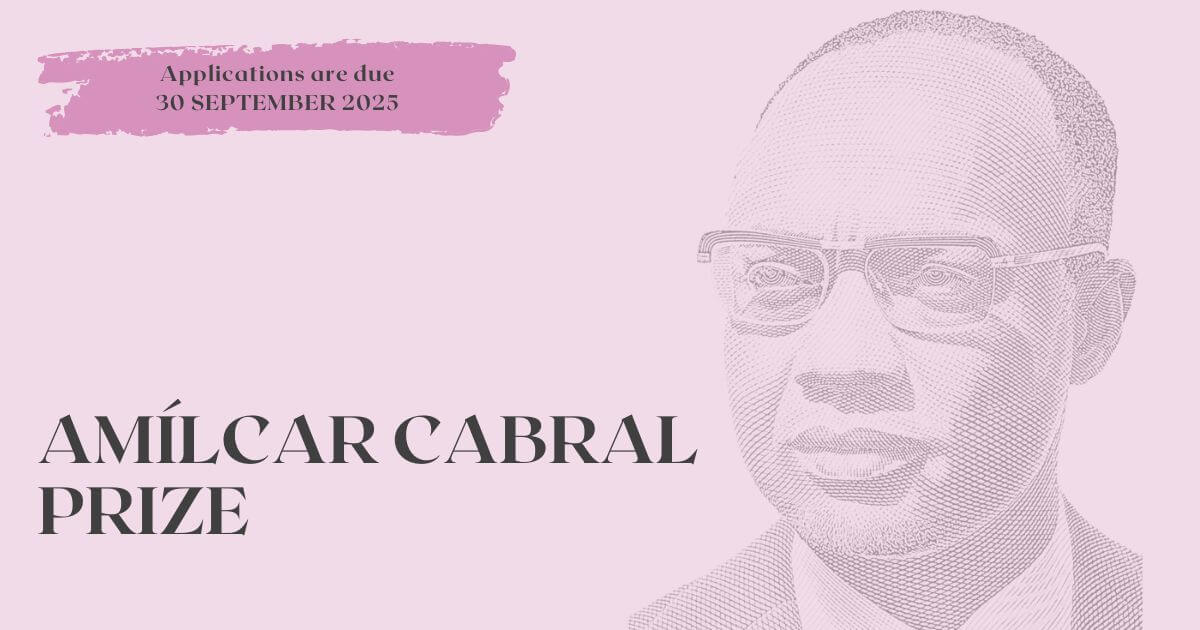Amílcar Cabral Prize – 4th Edition

Deadline for applications: 30 September 2025
Institutions: Institute of Contemporary History & Padrão dos Descobrimentos — Lisboa Cultura
RULES
- The Amílcar Cabral Prize (henceforth the Prize) is aimed at researchers of any nationality who have recently completed a doctorate at a national or foreign university.
- The Prize will be awarded annually, with the Jury able to deliberate its non-attribution whenever the works submitted justify this decision.
- The Prize is designed to honour an article of historical research that deals with any topic or issue relating to the history of anti-colonial resistance and colonial empires. The article may cover any geographical context in the world and any historical period, from the present day to the 15th century.
- The articles submitted must be authored solely by the respective applicant and published or accepted for publication in an academic journal (that must be indexed in the Scopus or Web of Science databases), with peer review, and written in either Portuguese or English.
- Applicants must have completed their doctorate within three calendar years prior to the closing date of the competition.
- In the fourth edition of the Prize, only those who have completed their doctorate after 1 October 2022 are eligible, and applications must be submitted until 30 September 2025. The results of the Prize will be announced and communicated by 31 December 2025.
- The application must be made in the form of a request addressed to the Chair of the Jury, including 1) a declaration that the Jury’s decision on the award will be accepted, 2) the applicant’s identification details, 3) a copy of the doctoral diploma (or equivalent document), and 4) the article submitted to the competition (if applicable, proof that it has been accepted for publication).
- Applications should be submitted via the email ihc.concursos@fcsh.unl.pt.
- The Prize covers the cost of travel and accommodation in Lisbon for a period of up to one month, in addition to other living costs (up to a maximum amount of € 3,000 — three thousand euros).
- In the fourth edition of this Prize, the stay in Lisbon shall take place during the year of 2026, on dates to be agreed between the parties. During this period, the winner will carry out scientific and cultural activities at NOVA FCSH and Lisboa Cultura facilities, namely in the Padrão dos Descobrimentos.
- In the fourth edition of the Prize, the Jury is:
a. Manuela Ribeiro Sanches (Institute of Contemporary History — NOVA FCSH; IN2PAST) — Chair;
b. Benedito Machava (Yale University) — Member;
c. Natalia Telepneva (University of Strathclyde) — Member;
d. Catarina Laranjeiro (IHC — NOVA FCSH / IN2PAST) — Reserve Member. - The Jury’s decision will be taken by majority, always excluding abstentions.
- The possibility of the Prize being awarded ex-aequo is excluded.
- The jury’s decision is final and there is no possibility of appeal.
You may download the Rules of the Prize HERE (📎 PDF).
Other opportunities
-
 Awards, Highlights, IHC, OpportunitiesDeadline: 30 September 2025
Awards, Highlights, IHC, OpportunitiesDeadline: 30 September 2025
Search
Events
novembro , 2025
Tipologia do Evento:
Todos
Todos
Colloquium
Conference
Conference
Congress
Course
Cycle
Debate
Exhibition
Launch
Lecture
Meeting
Movie session
Open calls
Opening
Other
Presentation
Round table
Seminar
Showcase
Symposium
Tour
Workshop
- Event Name
seg
ter
qua
qui
sex
sab
dom
-
-
-
-
-
1
2
3
4
5
6
7
8
9
10
11
12
13
14
15
16
17
18
19
20
21
22
23
24
25
26
27
28
29
30

Detalhes do Evento
José Pedro Castanheira's new book, about the political police of the Estado Novo during Salazar's rule, will be launched at the Camões Secondary School in Lisbon,
Ver mais
Detalhes do Evento
José Pedro Castanheira‘s new book, about the political police of the Estado Novo during Salazar’s rule, will be launched at the Camões Secondary School in Lisbon, with a presentation by Irene Flunser Pimentel and Jacinto Godinho.
Histórias da PIDE
Quando o Salazar mandava. Volume 1
Em 1965, o General Humberto Delgado, inimigo público número 1 de Salazar, foi assassinado perto de Badajoz por uma brigada da PIDE. A chefiá‑la estava Rosa Casaco, que, fugido do país a seguir ao 25 de Abril de 1974, viria a ser condenado a oito anos de prisão e a tornar‑se, após uma entrevista incluída neste livro, um dos rostos mais emblemáticos desta força policial.
Sólido e temido bastião do Estado Novo, ninguém escapava ao raio de ação da PIDE: nem Calouste Gulbenkian, o homem mais rico do mundo, que foi preso em 1942; nem o ex‑Presidente da República Marechal Craveiro Lopes, vítima de chantagem de carácter sexual; nem sequer o bispo D. Eurico Dias Nogueira, submetido a constante vigilância, com cartas interceptadas até para o Vaticano e para o próprio Salazar.
Estas são algumas das Histórias da PIDE que José Pedro Castanheira investigou ao longo dos anos para o Expresso, todas reportando neste volume ao período de Salazar. O segundo volume incidirá sobre a época de Marcello Caetano.
Mais informações sobre o livro
Tempo
(Quinta-feira) 6:00 pm - 7:30 pm
Organizador
Tinda da China and Camões Secondary School
News
Mélanie Toulhoat contributes to a University of Geneva project
Oct 30, 2025
Mélanie Toulhoat was invited to join the DEGESUD team — Decentering the “sciences of childhood”
IHC is awarded eight new CEEC contracts from FCT
Oct 22, 2025
New research contracts: four in the Junior category and four in the Assistant category
António Borges Coelho — In Memoriam
Oct 18, 2025
Statement of condolence from the Boards of IHC, IEM and CHAM




